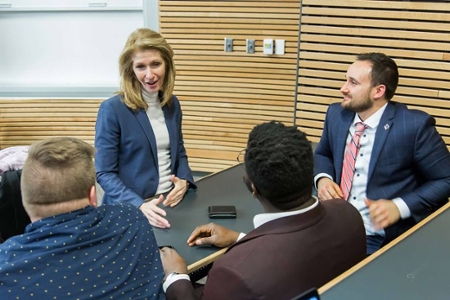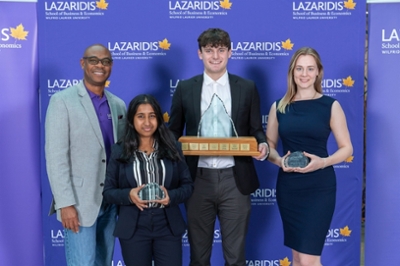We use cookies on this site to enhance your experience.
By selecting “Accept” and continuing to use this website, you consent to the use of cookies.
Search for academic programs, residence, tours and events and more.
By Suzanne Bowness
For students who want the freedom to find themselves in the world of business, the Lazaridis Bachelor of Business Administration (BBA) degree is big enough to offer many options, but designed in a way to let students get to know their classmates and keep them by their sides as friends and contacts for the future. That’s thanks in part to the cohort approach, where students move through the program with the same group of people, so there are always friendly faces in the classroom. Plus, the campus is small enough that each of those classrooms are close.
“Our program is unique because people come into the BBA directly into business, not through arts,” says program director Chima Mbagwu. “And when you go through the courses together, people form lifelong friendships.” He adds that the program also has a strong academic reputation, as verified externally by the school’s strong showing in global case competitions, as well as external exams such as the CPA for the accountancy stream.
Starting with a common first and second year, students take courses in business, accounting, micro- and macroeconomics, plus calculus, then foundational courses by second year in areas such as accounting and finance. By third year they start to stream into one of 10 business concentrations, including finance, accounting, marketing, entrepreneurship and HR management to name a few. They can also do a minor in another subject, in areas as varied as Music or UX design. Courses also qualify for several major professional designations, including the CPA (accounting), CFA (finance) and CHRP (human resources). Students even have the opportunity to gain international experience through established exchanges with universities in France, the UK, Italy, Spain and other countries.
For Raechel McGuire, a business and financial math double major, these highlights are the reason she chose the program and recommends it to others. Coming from a farming town north of Toronto, the small campus feel added a sense of community, as did the professors’ friendly attitudes. “You can walk across campus in ten minutes. I walk to class every day and see at least six people I know,” she says, adding that she got close to her professors who were open to long office visits and advice. “It’s a family feel.”

While she was fairly certain that she wanted to become an accountant, McGuire appreciated that the program structure allows students to sample a range of subjects before deciding. “I like the fact that it’s general business for the first years, you get to see what you like and get a bit of everything,” she says, noting that she while she did confirm her interest in accounting, she found herself also liking topics like marketing, particularly because of the case study focus. She also appreciated the cohort model. “You know the students better, so it’s less intimidating to do presentations together.”
McGuire also benefitted from the co-op program, which students can apply for after first year. McGuire landed a position at accounting firm Ernst and Young for her first co-op and stayed there for the next two co-op terms as well. Now as she’s graduating, she has a job offer to be an auditor with the company.
BBA students can also choose from many extracurricular activities. Mbagwu notes that many students join clubs specific to their discipline, such as Accounting Club or Marketing Club, but there are other options outside of that, from Debate Club to Finance and Trading. Clubs offer not only community building and social opportunities, but a way to connect with industry. For example, the Accounting Club hosts an annual dinner event at a fancy hotel and invites accounting firms to host booths and share what skills they are looking for.
According to Mbagwu, there are almost too many options and he has to remind students that their priority should be their academics. “What I tell students is find one club that appeals to you the most and become an active member. Students are interested in all of them, they’re so excited they join 10 clubs, but there only 24 hours in a day,” he says. Students can also participate in general university activities, for example McGuire played volleyball and dodgeball, and became a student orientation leader. She also found employment on campus as an instructional assistant in the math lab.
Yet another opportunity within the BBA is the chance to join business case competitions, competing globally against other schools. In third year, everyone also joins in the flagship internal competition, Integrated Case Exercise (ICE), working in teams to solve a real-world problem for a live client. Recent companies and challenges include helping marketing company GreenSpace Brands figure out how to position a new product in the market, and music recording studio Metalworks to launch a new app. The 10-day competition has teams meet with the client’s executive team, and in the end the best four teams present solutions to the board of the company. The winners get “huge bragging rights” says Mbagwu, not to mention an exciting experiential learning opportunity.

This sense of community plus a solid academic grounding means that by graduation, students are strong contenders for jobs in their concentration. Many in the accounting stream are hired into the large firms in Canada. In a recent career survey, 98 percent of grads had jobs in their field, says Mbagwu. Hiring firms include Unilever, Google, PepsiCo, and more. Mbagwu attributes students’ success to both the strong academics and also the confidence-building sense of community they find in the program. “All of these things in my mind make for a well-rounded graduate who has also made valuable connections and friendships.”